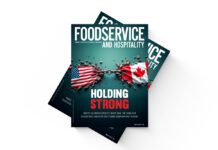TORONTO — This week, Restaurants Canada (RC) representatives will be in Washington, D.C. for a Tariff Trade Mission, collaborating with other business associations to push back the tariffs announced Tuesday. This trade mission will help garner support from U.S. Congress and Senate members, build ties with other allies in the U.S. and ensure conversations about tariffs in Washington include considerations for the restaurant industry on both sides of the border.
The first round of U.S. tariffs includes a 25 per cent tariff on all goods going into the U.S. from both Canada and Mexico, with a 10 per cent tariff on oil and gas. In response, Canada has issued an initial 25 per cent tariff on $30 billion worth of U.S. goods, with additional tariffs on another $125 billion worth of U.S. goods to come three weeks later, according to Prime Minister Justin Trudeau.
Numerous products vital to the foodservice industry will be affected. In response, RC, in collaboration with industry partners, continues to push for exemptions on a select list of critical food products, including lettuce, tomatoes, potatoes and food-safe packaging.
“Food is essential and we continue to ask the Canadian government to consider exempting a limited number of specific food items and food packaging from its retaliatory tariff response,” said Richard Alexander, EVP, Government Relations and Public Affairs, Restaurants Canada in a statement issued yesterday. “Without that exemption, prices will increase and hurt Canadians already dealing with affordability challenges. It will also lead to job loss in the foodservice industry.”
In addition to lobbying against harmful tariffs, Restaurants Canada has also advocated for:
- Exempting all food from sales tax, as it was during the GST/HST holiday.
- A wage-subsidy program to keep employees connected to their workplaces and prevent job losses.
- The removal of interprovincial trade barriers to help businesses adapt and recover.
- Manufacturing credits to enable food and packaging manufacturers to expand production quickly.
- Loosening regulations around packaging requirements from out of country products that may be substitutes for American-made products.
The association is working closely with the federal government to address industry concerns, highlighting the sector’s role as the fourth-largest private-sector employer and its significant impact on industries such as agriculture. “We have joined the Canada-U.S. Trade Council, a group of industry associations and organized labour across impacted sectors to share information and develop policy recommendations,” says a statement on the RC’s website.
The organization is working closely with the Retail Council of Canada, Canadian Chamber of Commerce, and the Canadian Produce Marketing Association to maximize the impact of this trade mission and minimize the impact of potential tariffs.
“We applaud recent efforts by the federal government and Nova Scotia, Ontario and British Columbia in reducing interprovincial trade barriers, and we urge other governments to follow their lead,” said Alexander. “A strong internal trade infrastructure will lead to more product availability, innovation and stability for the Canadian economy.”


















